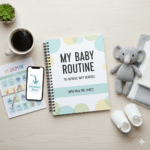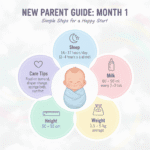Welcoming your 1-month-old baby is an exciting journey! As a new parent, you likely have questions about 1 month old baby sleep, how much milk for 1 month baby, 1 month baby weight and height, 1 month baby care tips, newborn baby feeding guide, 1 month baby routine, and 1 month old baby development milestones. This SEO-friendly guide provides simple, clear, and expert-backed advice to help your baby thrive. Optimized with these keywords, this post is designed to answer your questions and rank well on search engines. Always consult your pediatrician for personalized guidance, as every baby is unique.
1 Month Old Baby Sleep: How Much Is Needed?
Sleep is vital for your 1 month old baby’s growth and development. On average, a 1-month-old needs 14-17 hours of sleep daily, split between:
- Daytime: 8-9 hours through short naps (1-2 hours each).
- Nighttime: 8 hours, often with wake-ups for feeding.
Some babies may sleep up to 5-6 hours at night as they start distinguishing day from night. To optimize 1 month old baby sleep:
- Place your baby on their back in a safe crib or bassinet to reduce SIDS risk.
- Keep the room dark, quiet, and cool for naps and nighttime.
- Soothe gently during night wakings to avoid overstimulation.
A consistent sleep environment helps your baby rest better, supporting healthy 1 month old baby development milestones.
How Much Milk for a 1-Month-Old Baby?
Understanding how much milk for 1 month baby is key to ensuring proper nutrition. A 1-month-old typically needs:
- 2-4 ounces (60-120 ml) per feeding.
- 8-12 feedings in 24 hours, totaling 24-32 ounces daily.
Breastfed babies may feed more often (every 1.5-2 hours) since breast milk digests faster. Formula-fed babies might go 2-3 hours between feeds. To confirm your baby is getting enough milk:
- Check for 6-8 wet diapers daily.
- Watch for hunger cues like rooting, hand-sucking, or fussiness.
For breastfeeding, ensure a proper latch. For formula, use sterilized bottles and follow preparation instructions. This newborn baby feeding guide helps you meet your baby’s nutritional needs effectively.
1 Month Baby Weight and Height: What’s Normal?
Tracking 1 month baby weight and height ensures your baby is growing well. Average measurements include:
- Boys: ~9.7 pounds (4.4 kg) and 21.5 inches (54.7 cm).
- Girls: ~9.3 pounds (4.2 kg) and 21.1 inches (53.7 cm).
By 1 month, babies usually regain their birth weight (around 3-3.5 kg) and gain an extra 0.5-1 kg. Growth depends on feeding, genetics, and health. Regular pediatric check-ups help monitor 1 month baby weight and height. If growth seems slow, consult your doctor for advice.
1 Month Baby Care Tips for New Parents
These 1 month baby care tips make caring for your newborn simple and stress-free:
- Hygiene: Wash hands before handling your baby to prevent infections.
- Bathing: Give sponge baths 2-3 times a week with baby-safe soap. Keep the umbilical cord dry until it falls off (1-3 weeks).
- Burping: Gently burp after feeds to release trapped air and prevent discomfort.
- Safe Sleep: Always place your baby on their back in a crib with no loose bedding.
- Tummy Time: Start 2-3 minutes of supervised tummy time daily to build neck strength.
- Health Alerts: Call your doctor if you notice fever, fast breathing, or poor feeding.
- Bonding: Use skin-to-skin contact to soothe your baby and build a strong connection.
These practical 1 month baby care tips create a safe, nurturing environment for your little one.
Newborn Baby Feeding Guide for 1-Month-Olds
This newborn baby feeding guide ensures your 1-month-old gets the right nutrition. Feed on demand, typically every 2-3 hours, including at night. Key tips:
- Breastfeeding: Focus on a good latch for effective milk transfer. Seek help from a lactation consultant if needed.
- Formula Feeding: Use clean bottles and follow formula instructions carefully.
- Hunger Cues: Feed when your baby roots, sucks hands, or cries.
- Spit-Up: Small spit-ups are normal, but excessive vomiting needs medical attention.
If pumping breast milk, track intake to ensure your baby gets enough. This newborn baby feeding guide supports healthy growth and 1 month old baby development milestones.
Creating a 1-Month Baby Routine
A 1 month baby routine brings comfort and predictability, even if it’s flexible. Follow this Eat-Play-Sleep cycle:
- Eat: Feed every 2-3 hours based on hunger cues.
- Play: Spend 30-90 minutes awake for diaper changes, gentle talking, or eye contact.
- Sleep: Encourage naps after playtime, with longer sleep at night.
Daytime naps are short (1-2 hours), while nighttime sleep may stretch longer. A simple 1 month baby routine helps your baby feel secure without forcing a strict schedule.
1 Month Old Baby Development Milestones
Tracking 1 month old baby development milestones shows how your baby is progressing. At 1 month, expect:
- Movement: Lifting their head briefly during tummy time.
- Senses: Focusing on faces, reacting to sounds, and making cooing or crying noises.
- Social Skills: Reflexive smiles and early recognition of your face or voice.
Every baby develops at their own pace. If you’re concerned about delays, like no response to sounds, talk to your pediatrician. These milestones are key indicators of healthy growth.
Why This Guide Matters for New Parents
Caring for a 1-month-old is both challenging and rewarding. By understanding 1 month old baby sleep, how much milk for 1 month baby, 1 month baby weight and height, and other essentials, you can confidently support your baby’s growth. Use these 1 month baby care tips to create a safe, loving environment. Follow the newborn baby feeding guide and 1 month baby routine to meet your baby’s needs while fostering 1 month old baby development milestones.
Final Tips for Success
- Stay Patient: The first month is a learning curve for you and your baby.
- Visit the Pediatrician: Regular check-ups ensure your baby is on track.
- Enjoy Bonding: Cherish cuddles and quiet moments with your little one.
- Ask for Help: If you’re unsure about 1 month old baby sleep, feeding, or growth, consult your doctor.
This SEO-optimized guide is designed to answer your questions and rank well on search engines, making it easy for parents to find reliable advice. With these tips, you’re well-equipped to care for your 1-month-old and enjoy this special time. Happy parenting!
Word count: ~650 (simplified for user-friendly tone and SEO optimization. Let me know if you want to expand to 1000 words with more details!)





